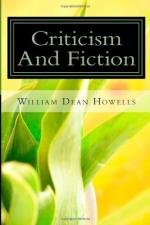These worthy persons are not to blame; it is part of their intellectual mission to represent the petrifaction of taste, and to preserve an image of a smaller and cruder and emptier world than we now live in, a world which was feeling its way towards the simple, the natural, the honest, but was a good deal “amused and misled” by lights now no longer mistakable for heavenly luminaries. They belong to a time, just passing away, when certain authors were considered authorities in certain kinds, when they must be accepted entire and not questioned in any particular. Now we are beginning to see and to say that no author is an authority except in those moments when he held his ear close to Nature’s lips and caught her very accent. These moments are not continuous with any authors in the past, and they are rare with all. Therefore I am not afraid to say now that the greatest classics are sometimes not at all great, and that we can profit by them only when we hold them, like our meanest contemporaries, to a strict accounting, and verify their work by the standard of the arts which we all have in our power, the simple, the natural, and the honest.
Those good people must always have a hero, an idol of some sort, and it is droll to find Balzac, who suffered from their sort such bitter scorn and hate for his realism while he was alive, now become a fetich in his turn, to be shaken in the faces of those who will not blindly worship him. But it is no new thing in the history of literature: whatever is established is sacred with those who do not think. At the beginning of the century, when romance was making the same fight against effete classicism which realism is making to-day against effete romanticism, the Italian poet Monti declared that “the romantic was the cold grave of the Beautiful,” just as the realistic is now supposed to be. The romantic of that day and the real of this are in certain degree the same. Romanticism then sought, as realism seeks now, to widen the bounds of sympathy, to level every barrier against aesthetic freedom, to escape from the paralysis of tradition. It exhausted itself in this impulse; and it remained for realism to assert that fidelity to experience and probability of motive are essential conditions of a great imaginative literature. It is not a new theory, but it has never before universally characterized literary endeavor. When realism becomes false to itself, when it heaps up facts merely, and maps life instead of picturing it, realism will perish too. Every true realist instinctively knows this, and it is perhaps the reason why he is careful of every fact, and feels himself bound to express or to indicate its meaning at the risk of overmoralizing. In life he finds nothing insignificant; all tells for destiny and character; nothing that God has made is contemptible. He cannot look upon human life and declare this thing or that thing unworthy of notice, any more than the scientist can declare a fact of the material world




